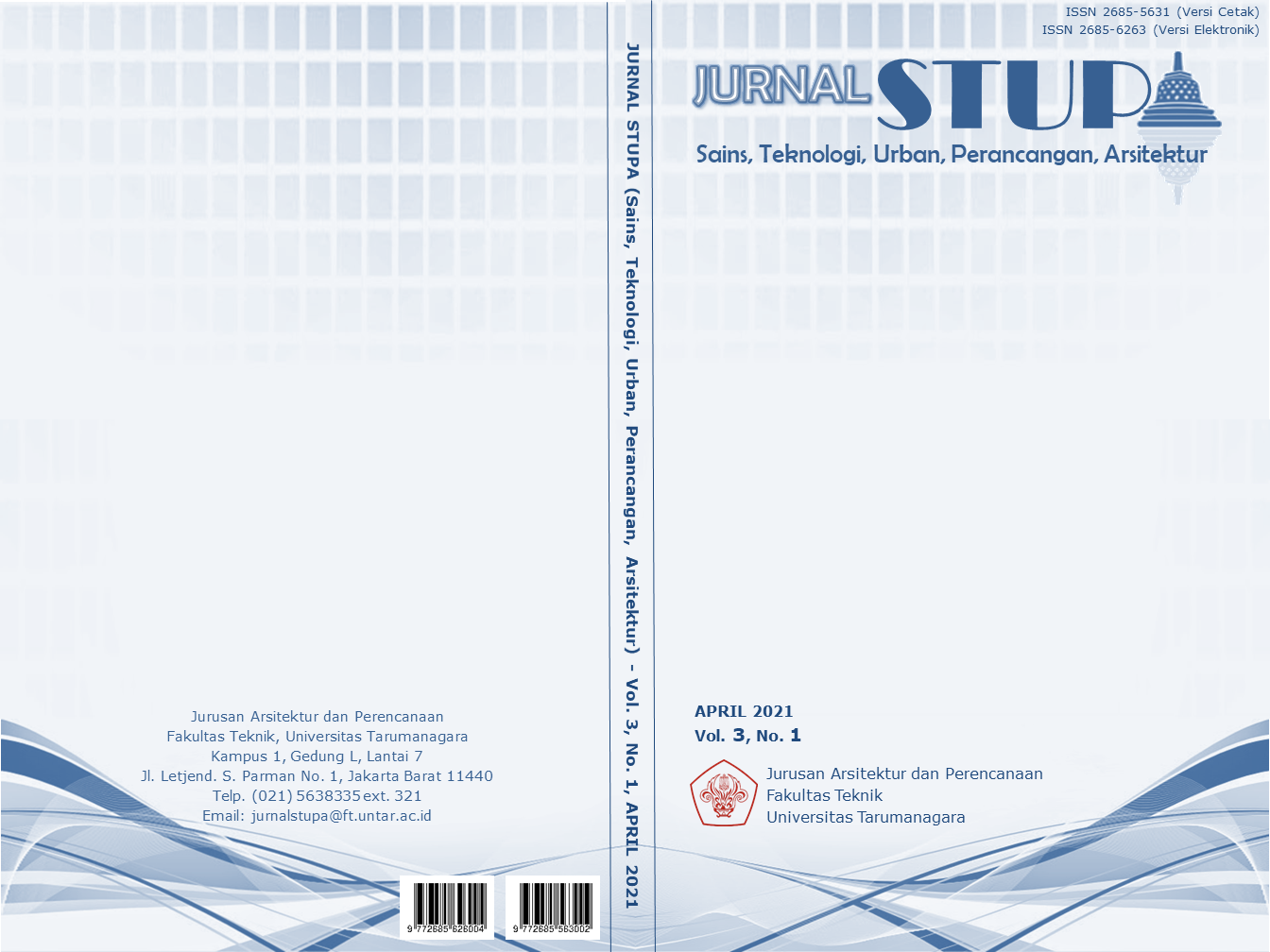HIDUP BERDAMPINGAN DENGAN SAMPAH DI DESA SANUR
Main Article Content
Abstract
Human dwelling to survive, so that their existence can be seen in the world (Heidegger, 1971). In his life, humans will produce garbage. The consumptive culture of the community causes the amount of waste to increase day by day. According to the European Commission, Indonesia is the country with the second largest waste producer in the world, with a low recycling rate (22%). In Indonesia, South Denpasar (Sanur) is the city with the highest waste problem with lowest recycling rate. This design project aims to create a living space in South Denpasar (Sanur) that is able to coexist with garbage, make people interact and be educated on the importance of recycling their own waste, and live in the future while still applying the tri hita karana concept by minimizing waste production. By using this type of qualitative descriptive approach, starting with the stage of literatur to study the related dwelling, waste recycling, the concept of tri hita karana. second, field observations to determine the condition of the site around, people's daily behavior. Third, comparing several case studies to present several programs that will be created in this project. Fourth, compile/tabulate the results of observations and data so that we can find out the spatial scenario and calculate the amount that will be created. Applying the tri hita karana concept with Zero Waste Living to the project, as an approach to community culture, then providing a program that educates the public about waste recycling, not only that, the concept of using building materials derived from recycling is also presented in this project so that it can create Bali clean and green province.
Keywords: Sustainable living; Waste Problem; Zero Waste Living
Abstrak
Manusia Dwelling untuk bertahan hidup sehingga terlihat keberadaannya / kehadirannya di dunia (Heidegger, 1971). Di kehidupannya manusia akan menghasilkan sampah. Budaya masyarakat yang konsumtif menyebabkan jumlah sampah kian hari kian bertambah. Menurut European Commision, Indonesia adalah negara dengan produsen sampah kedua terbesar di dunia, dengan tingkat daur ulang yang rendah (22%). Di Indonesia, Denpasar Selatan (Sanur) merupakan kota dengan permasalahan sampah tertinggi dengan tingkat daur ulang yang rendah. Proyek rancangan ini bertujuan untuk menciptakan ruang berhuni di Denpasar Selatan (Sanur) yang mampu berdampingan dengan sampah, membuat masyarakat berinteraksi dan teredukasi dengan pentingnya mendaur ulang sampah, dan hidup dimasa depan dengan tetap menerapkan konsep tri hita karana dengan meminimalkan produksi sampah. Dengan menggunakan jenis pendekatan deskriptif kualitatif, diawali dengan tahapan studi literatur terkait dwelling, pendaur ulangan sampah, konsep tri hita karana. kedua, observasi lapangan untuk mengetahui kondisi tapak sekitar, perilaku masyarakat sehari-hari. Ketiga, mengkomparasikan beberapa studi kasus untuk menghadirkan beberapa program yang akan diciptakan dalam proyek ini. Keempat, mengkompilasi/mentabulasi hasil dari observasi maupun data sehingga dapat mengetahui scenario ruang dan mengkalkulasikan besarannya yang akan di buat. Menerapkan konsep tri hita karana dengan Zero Waste Living pada proyek, sebagai pendekatan terhadap kebudayaan masyarakat , lalu memberikan program yang mengedukasi masyarakat tentang daur ulang sampah, tidak hanya itu konsep penggunaan material bangunan yang berasal dari daur ulang juga di hadirkan pada proyek ini sehingga dapat menciptakan Bali clean and green province.
Article Details
Section
References
Budihardjo, E. (1986). Architectural Conservation in Bali. Yogyakarta: Gadjah Mada University Press.
Heidegger, M. (1971). Building Dwelling Thinking. New York: Harper Colophon Books.
King, P. (2004). Private Dwelling: Contemplating the use of housing. United Kingdom: Routledge.
Marcus, C. C. (2006). HouseaAs a Mirror of Self: Exploring the Deeper Meaning of Home. Los Angeles: Nicholas-Hayes, Inc.
Pemerintah Kota Denpasar (2014). Peraturan Walikota Denpasar Nomor 15 Tahun 2014 Tentang Peraturan Zonasi Kecamatan Denpasar Selatan.
Sharr, A. (2007). Heidegger for Architects: Building Dwelling Thinking. United Kingdom: Routledge.
Sugiyono. (2017). Metode Penelitian Kuantitatif, Kualitatif, dan R&D. Bandung: Alfabeta, CV.
County, Hennepin. Zero Waste Guide: Tips and tricks for a low-waste lifestyle. Diunduh 6 Agustus 2020. https://www.hennepin.us/-/media/hennepinus/residents/recycling/zero-waste/zero-waste-guide-2017.pdf
Garnesia, Irma. Mengintip Kota-kota Gudang Sampah di Indonesia. Diunduh 6 Agustus 2020. https://tirto.id/mengintip-kota-kota-gudang-sampah-di-indonesia-cE4o
Hartriani, Jeany. Ekonomi Melingkar, Solusi Sampah Indonesia. Diunduh 5 September 2020. https://katadata.co.id/herisusanto/infografik/5e9a56c32c3b0/ekonomi-melingkar-solusi-sampah-indonesia
M Muller, Simone. Environment & Society Portal: The Life of Waste. Diunduh 10 September 2020. http://www.environmentandsociety.org/exhibitions/life-waste

